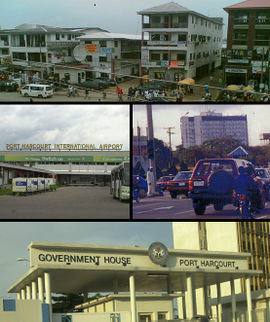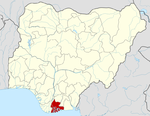Port Harcourt
| Port Harcourt | |
|---|---|
| — City — | |
 Middle: Port Harcourt International Airport, The City Center Bottom: Government House, Port Harcourt |
|
| Nickname(s): Garden city | |
 Port Harcourt
|
|
| Coordinates: | |
| Country | |
| State | Rivers State |
| Government | |
| - Chairman of Port Harcourt City Council | Azubuike Nmerukini[1] |
| Area | |
| - City | 186 km2 (71.8 sq mi) |
| - Land | 170 km2 (65.6 sq mi) |
| - Water | 16 km2 (6.2 sq mi) |
| - Metro | 462 km2 (178.4 sq mi) |
| Population (2007) | |
| - Urban | 2,667,435 |
| - Metro | 3,761,645 |
| - Ethnicities | Ikwerre, Ijaw |
| - Religions | Christianity 90%, |
| estimated | |
| Time zone | WAT (UTC+1) |
| Area code(s) | 084 |
Port Harcourt is the capital city of Rivers State, Nigeria. It lies along the Bonny River and is located in the Niger Delta.[2] By number of inhabitants, it is the fifth largest city in Nigeria. The population of Port Harcourt is estimated at 1,620,214 (2007), the Port Harcourt Urban area is 2.7 million while the Greater Port Harcourt Area is almost 5.7 million in population. The Mayor of Port Harcourt City is Azubuike Nmerukini, an Ikwere native.
Contents |
History
Port Harcourt was founded in 1912 by the British in an area traditionally inhabited by the Ikwerre, an Igbo subgroup.[3] It was named after Lewis Vernon Harcourt, Secretary of State for the Colonies.[4][5] The initial purpose of the port was to export the coal which geologist Albert Ernest Kitson had discovered in Enugu. In August 1913, the Governor-General of Nigeria, Sir Frederick Lugard wrote to Harcourt, then Secretary of State for the Colonies, "in the absence of any convenient local name, I would respectfully ask your permission to call this Port Harcourt."[6] To this the Secretary of State replied "It gives me pleasure to accede to your suggestion that my name should be associated with the new port."[6]
Geography and infrastructure
Geography
The main city of Port Harcourt is the Port Harcourt town in the Port Harcourt City Local Government Area, consisting of the former European quarters now called old Government reservation area (GRA) and New layout areas. The Port Harcourt Urban Area (Port Harcourt metropolis) is made up of the city itself and parts of Obio/Akpor Local Government Area.[7]. Port Harcourt City, which the capital of Rivers State, is highly congested as it is the only major city of the state. A law has recently passed by the state house and governor Amaechi's administration to spread develop to the surrounding communities as part of the effort to decongest Port Harcourt. The greater Port Harcourt City, as it is officially known, spans eight local government areas that include Port Harcourt, Okrika, Obio/Akpor, Ikwerre, Oyigbo and Ogu/Bolo. Also, other ethnicities includes Tai, and Eleme.
Infrastructure
Some of Port Harcourt's more popular and well-known residential areas are Port Harcourt Township (better known simply as Town), G.R.A phases 1-5, Rumuomasi, Orogbum nu Oro Abali (known as Ogbunuabali), Rumuola, Diobu, Amadi Flats, and Borokiri. The main industrial area is located in Trans Amadi. Face-me-I-face-you architecture is quite common to Port Harcourt.
The city plays host to the Rivers State University of Science and Technology; there is also a University of Port Harcourt, which is Located in Obio/Akpor which was carved out of Port Harcourt Local Government Area for ease of administration.
The Podium Block of Rivers State Secretariat is an icon of the city. An eighteen storey building, it has the tallest building in the South/South and South/East Geopolitical zones combined. The city has an international airport, Port Harcourt International Airport, two seaports (F.O.T Onne, PortHarcourt Wharf), two stadiums (Sharks Stadium which is actually the civic center] and Liberation Stadium located in Elekahia and two refineries.
The city is sprawling in nature as building codes and zoning regulations are poorly enforced. Land is cleared and 'lean to' buildings constructed sometimes overnight. This adds to flooding and sanitation problems since with no proper drainage or sewer system, parts of the city flood during the very heavy monsoon-type rains that fall for half the year.
Climate
Port Harcourt features a tropical monsoon climate with lengthy and heavy rainy seasons and very short dry seasons. In fact, only the months of December and January truly qualifies as dry season months in the city. The harmattan, which climatically influences many cities in West Africa, is less pronounced in Port Harcourt. Port Harcourt’s heaviest precipitation is seen during the month of September where on average approximately 370 mm of rain is seen. December on average is the driest month of the year, where on average only 20 mm of rain is seen during the course of the month. Temperatures throughout the year in the city are relatively constant, showing little variation throughout the course of the year. Average temperatures are typically between 25°C-28°C in the city.
| Port Harcourt | ||||||||||||||||||||||||||||||||||||||||||||||||||||||||||||
|---|---|---|---|---|---|---|---|---|---|---|---|---|---|---|---|---|---|---|---|---|---|---|---|---|---|---|---|---|---|---|---|---|---|---|---|---|---|---|---|---|---|---|---|---|---|---|---|---|---|---|---|---|---|---|---|---|---|---|---|---|
| Climate chart () | ||||||||||||||||||||||||||||||||||||||||||||||||||||||||||||
|
||||||||||||||||||||||||||||||||||||||||||||||||||||||||||||
|
||||||||||||||||||||||||||||||||||||||||||||||||||||||||||||
Economy
The city is a major industrial center as it has a large number of multinational firms as well as other industrial concerns, particularly business related to the petroleum industry. It is the chief oil-refining city in Nigeria.Rivers state is one of the wealthiest states in Nigeria in terms of gross domestic product and foreign exchange revenue from the oil industry, crude oil being its main export earner.
Security issues
In recent times, the activities of several armed militant gangs has cast a huge shadow on life and commerce in the once peaceful town. These gangs that for the most part claim to fight for the interest of the indigenous people of Rivers State and the Niger Delta region of Nigeria by asking for a share Nigeria's oil wealth, are however better noted and feared for violent conduct that include random and targeted killings, arson, kidnappings of both foreign workers and indigenous people and bombings. After a spate of violence in 2007, a curfew was imposed on the town, this was however lifted by the Governor of Rivers State in the last days of 2007. On New Year's Eve 2007, Port Harcourt was once again rocked by violence which left at least sixteen people dead. Ateke Tom, the leader of one of the more prominent militias claimed responsibility for most of the fatalities. But now,Port Harcourt has seemingly had some sense of peace and security due to the introduction of the amnesty by the federal Government for the militants.
Greater Port-Harcourt City
In early 2009 the State Government under the leadership of Governor Chibuike Amaechi announced plans for the creation of a new city to be called the Greater Port-Harcourt City. The new city is to be located close to the Port-Harcourt International Airport.[8]
References
- ↑ "Briggs charges LG bosses on performance". www.vanguardngr.com. Vanguard (Lagos), Thursday, April 24, 2008. http://www.vanguardngr.com/index.php?option=com_content&task=view&id=7271&Itemid=44. Retrieved 2009-04-15.
- ↑ "Port Harcourt". Encyclopædia Britannica Online. Encyclopædia Britannica, Inc. http://www.britannica.com/eb/article-9060922/Port-Harcourt. Retrieved 2007-01-31.
- ↑ "Waterfronts, nobody’s ancestral home – David-West". www.vanguardngr.com. Vanguard (Lagos) Friday, December 10, 2009. http://www.vanguardngr.com/2009/12/10/waterfronts-nobody%E2%80%99s-ancestral-home-david-west/. Retrieved 2009-12-10.
- ↑ "Port Harcourt, capital of Rivers state". PortHarcourt.com. http://www.portharcourt.com/. Retrieved 27 July 2010.
- ↑ Room, Adrian (2006) (in english). Placenames of the World (2 ed.). North Carolina, USA: McFarland & Company. p. 300. ISBN 0-7864-2248-3. http://books.google.com/books?id=M1JIPAN-eJ4C&pg=PA300&dq=Placenames+of+the+World+port+harcourt&hl=de&ei=sQFPTIDsBJa6jAf6lo3JBw&sa=X&oi=book_result&ct=result&resnum=1&ved=0CC4Q6AEwAA#v=onepage&q&f=false.
- ↑ 6.0 6.1 Idam, Jossy (17 May 2009). "Port Harcourt, Paradise lost, now regained". The Daily Sun (Nigeria: The Sun Publishing Limited). http://www.sunnewsonline.com/webpages/features/living/2009/may/17/Great-cities-17-05-2009-001.htm. Retrieved 2009-09-25.
- ↑ Ogbonna, D.N. / Amangabara, G.T. / Ekere, T.O.: "Urban solid waste generation in Port Harcourt metropolis and its implications for waste management", Management of Environmental Quality: An International Journal, Volume: 18 Issue: 1; 2007
- ↑ Onoyume, Jimitota (8 April 2009). "Nigeria: Why Rivers is Embarking on Port Harcourt City Project - Nwuke". AllAfrica.com (AllAfrica Global Media). http://allafrica.com/stories/200904080024.html. Retrieved 2009-09-25.
External links
|
|||||||
|
|||||||||||||||||||||||||||||||||||||||
